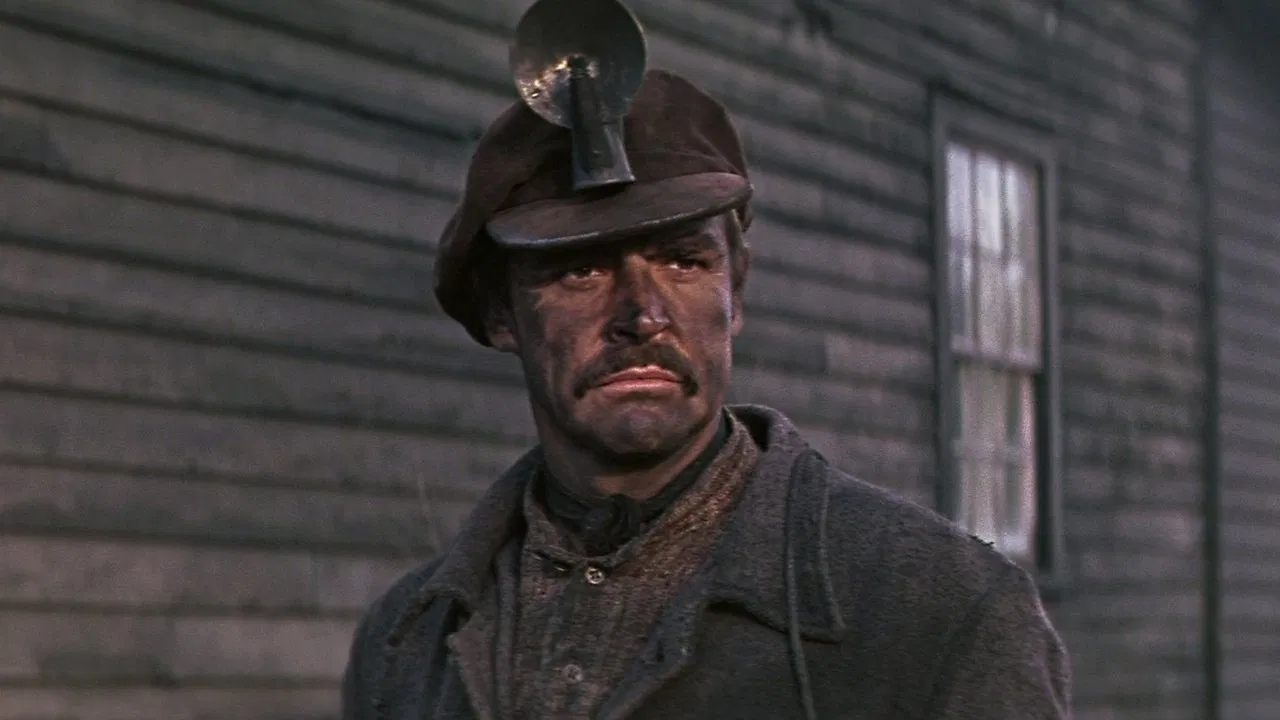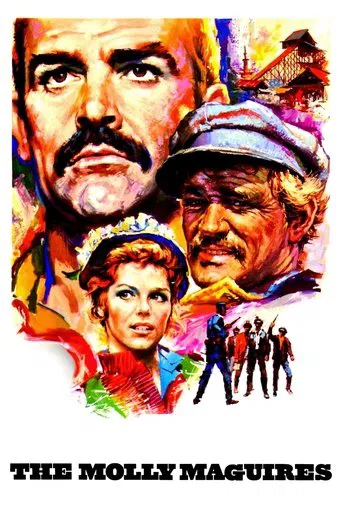

This is one of the great immigrant movies; it speaks in a manner simple and concise about what it means to be the outsider, to be used and abused and your voice never heard, to be at the bottom of the barrel looking up. It speaks about despair violence and moral devastation in the Pennsylvania coal mines of 1876, about right and wrong, law and ethos, and their flipsides, violence and anarchy. The movie's characters have amazingly human needs, some of them to be heard in that shanty town of Pennsylvania and others to get away from it. Richard Harris plays one of the most fascinating complex characters I've seen. I love his type of character so much because he's the villain, the one we must boo, but he doesn't give a damn about our booing, he doesn't look for absolution or forgiveness in the end. I like characters who have what it takes to be the bad guy.He's paid to infiltrate a radical group of coalworkers, The Molly Maguires, find out who they are and give them up. For a time he sympathizes with their cause, he goes down to the coal mines and comes out with the same paste of coaldust grime and sweat on his face and gets paid 24 cents a week for it, but when he needs to name names he does so without flinching. Like the Irish coal miners he mingles with, he's a man "at the bottom of the barrel", but unlike them, he wants to be at the top of the barrel looking down. He finds love, his boarding lady who's desperate to get out of that coaldusted hellhole, a woman of strict ethics who wants decency and lawfulness. He tells her that "you buy decency and respectability like you buy a loaf of bread", so that he recognizes the futility of the Mollies' struggle and can't help to be drawn to it, to that fleeting sparkle of futile human defiance against injustice. But that's not the movie's meridian, although it feels so at the time. A little later we get a magnificent discussion in a tavern, during a wake, between himself and Sean Connery, brooding leader of the Mollies', where Richard Harris tells him that he'll never die, that he's going to live forever.It struck me like a brick, like reading Judge Holden speak to his scalphunter comrades in Blood Meridian around a campfire in the middle of the desert, because essentially and metaphorically, that is true; everybody else will pass away, the men who struggle and fight oppression and the men who die "without making a pip", but Richard Harris will live forever. He's deceit everlasting, the cosmic trickster. During their trial, when the prosecutor against the Mollies' calls for the first witness, a door to an adjacent room opens and we see Richard Harris calmly playing cards with the police captain, a man he has nothing but contempt for. In the end, there's neither punishment nor forgiveness for him, he's beyond all that, a little above and beyond everything else, damnation and vengeance, beyond even love or self-pity, human compassion and regret too. In the end he walks by a newly erected scaffold being tested by prison wardens, and he simply walks away never looking back. He's not even going away to Denver, Colorado, to be in charge of a detective agency there, he goes beyond that, [...] he never sleeps, he says that he will never die, he dances in light and in shadow and he is a great favourite, he never sleeps, he says that he will never die. Perfect.What's not perfect is the bogus score by Henry Mancini, basically upbeat irish folk reworkings. Maybe 16 Horsepower should redo this one.
... View MoreAdaptation of Arthur H. Lewis' book, which was based on actual accounts, about a Pennsylvania coal-mining town in 1876 and the secret group of rebels who are sabotaging the mines. Stranger-in-town Richard Harris is actually a detective sent there to ferret out the culprits. Downbeat story might have stood some tightening (and possibly a little mood-lightening levity), but is otherwise quite good. Director Martin Ritt works exceptionally well with his cast, getting a terrific, surprisingly low-keyed performance out of Harris in particular; scaling back his high voltage nature, Harris is even approachable enough to make the romance sub-plot between he and Samantha Eggar rather sweet. Sean Connery is sturdy as always, and the colorful supporting cast includes Frank Finlay and Anthony Zerbe, an intriguing character actor who pops up in a myriad of '70's films. **1/2 from ****
... View MoreRICHARD HARRIS is an informer who works his way into THE MOLLY MAGUIRES, a rebellious group and a secret society of Irish immigrants working under brutal coalmining conditions of 1876. Harris is suspected of snooping by SEAN CONNERY, the leader of the group, and it is their scenes together that make the film worth watching.Although realistically set in a Pennsylvania mining town, lovingly photographed with detailed attention to all the grime and soot, it fails to come to life as it should, given the caliber of the stars involved. SAMANTHA EGGAR has the only important female role and is a splendid addition to the cast, but somehow the film fails to have the kind of pace it needs to remain stimulating and reaches a rather inconclusive climax.A very atypical score by Henry Mancini adds to the atmosphere, but this is a film that never had broad enough appeal for the mass market. Fans of Harris and Connery should find it rewarding enough.
... View MoreAccording to the Films of Sean Connery, the genesis of The Molly Maguires was a visit to the set of Director Martin Ritt;s Hombre in which Connery's then wife Diane Cilento was in the cast. Ritt had the idea for The Molly Maguires back then and asked Connery if he'd give him the commitment. Connery was intrigued and said yes. But it took over four years to get the project rolling.The Molly Maguires has the ring of authenticity to it because Martin Ritt chose to shoot it in an almost abandoned Pennsylvania coal town of Ecksley. Filming the story in a place where the Molly Maguires were active lends a lot of credibility to the film. The Mollys were a secret cell within the Catholic fraternal society of the Ancient Order of Hibernians. The Irish immigrants spread all over America and a good deal of them arrived in the Pennsylvania coal country where they became miners. A trade not unknown in Ireland as that country has considerable deposits of the stuff. The workers were terribly exploited, having to live in the company town, buy at the company store, and pay for damaged equipment. That together with the health problems we know now about in the mining industry.There was no organized labor movement yet and the Mollys were at times the only protections those miners had. They'd be considered terrorists now, but an important thing to remember is that unlike today's terrorists, their acts of violence were never random.One thing I did like was the fact that the company policeman were Protestant and Welsh. That was the generation who were the previous people in the mines. The next generation of coal miners were from Eastern Europe, but that's getting ahead of ourselves. The ethnic conflicts are quite explicit in this film.Richard Harris plays James McParlan another Irish immigrant sent by the Pinkerton Detective Agency to infiltrate and destroy the Mollys. Connery is Jack Kehoe the leader of them and very suspicious of Harris when he first arrives to work at the mines. The story as told in the film sticks pretty close to the truth of what happened in Pennsylvania in the 1870s. Informers are not a group that's looked up to in any culture, but the Irish traditionally do have a special disdain for them.The film is a clash between two men, Harris who wants to rise in class and willing to sell anyone out to do it and Connery whose methods maybe wrong, but has the genuine interest of his fellow miners at heart. After the business in Pennsylvania is concluded and after the action of this film, the real McParlan rose high in the Pinkerton agency, but his name was an anathema among his own people.The Molly Maguires is a well crafted piece of cinema that unfortunately failed to find an audience back in 1970. Today it's considered a masterpiece and deservedly so.
... View More